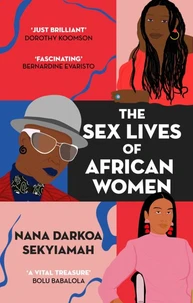A bold foray into African traditions around sexual pleasure and joy, with the personal goal of self-discovery and liberation, by one of Africa's preeminent feminists who 'is changing the way African women talk about sex' (Harper's Bazaar). While working on her first 'groundbreaking' (Ms. Magazine) book, The Sex Lives of African Women, acclaimed African feminist and activist Nana Darkoa Sekyiamah had access to the wildest dreams and spiciest realities of women from around the world.
But so often, she noticed that something was holding these women back from achieving full liberation and unfettered joy. So, she set out to apply sankofa-which means learning from the past to inform the future-to sex and pleasure, reclaiming African traditions in a quest to achieve sexual freedom. Organised in three parts, Sekyiamah first takes readers across the African continent, from Senegal to Tanzania and beyond, where she meets and trains with gurus, 'witches', and aunties whose job it is to guide girls through puberty rites and later through 'marital training.' She discusses practices like beading and pulling, while highlighting the spiritual and gender-fluid nature of African traditional religions.
The second part of the book asks us how we've lost our way, looking at the incursion of colonialism and western patriarchal norms into sexuality which has led to our warped ideals of beauty and shame, internalized racism, as well as state and interpersonal violence that stand in the way of sexual liberation. Finally, Sekyiamah shows that we can overcome these hurdles by returning to a more joyful and free sexual practice, using practical advice and prompts to chart our own journey.
A bold foray into African traditions around sexual pleasure and joy, with the personal goal of self-discovery and liberation, by one of Africa's preeminent feminists who 'is changing the way African women talk about sex' (Harper's Bazaar). While working on her first 'groundbreaking' (Ms. Magazine) book, The Sex Lives of African Women, acclaimed African feminist and activist Nana Darkoa Sekyiamah had access to the wildest dreams and spiciest realities of women from around the world.
But so often, she noticed that something was holding these women back from achieving full liberation and unfettered joy. So, she set out to apply sankofa-which means learning from the past to inform the future-to sex and pleasure, reclaiming African traditions in a quest to achieve sexual freedom. Organised in three parts, Sekyiamah first takes readers across the African continent, from Senegal to Tanzania and beyond, where she meets and trains with gurus, 'witches', and aunties whose job it is to guide girls through puberty rites and later through 'marital training.' She discusses practices like beading and pulling, while highlighting the spiritual and gender-fluid nature of African traditional religions.
The second part of the book asks us how we've lost our way, looking at the incursion of colonialism and western patriarchal norms into sexuality which has led to our warped ideals of beauty and shame, internalized racism, as well as state and interpersonal violence that stand in the way of sexual liberation. Finally, Sekyiamah shows that we can overcome these hurdles by returning to a more joyful and free sexual practice, using practical advice and prompts to chart our own journey.

 , qui est-ce ?
, qui est-ce ?